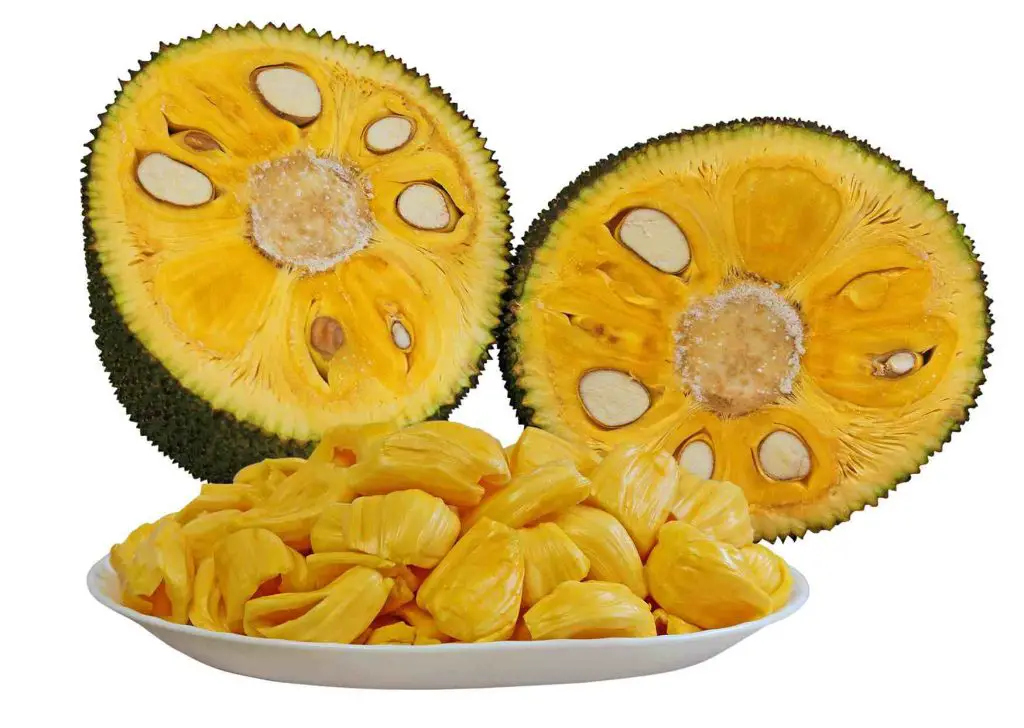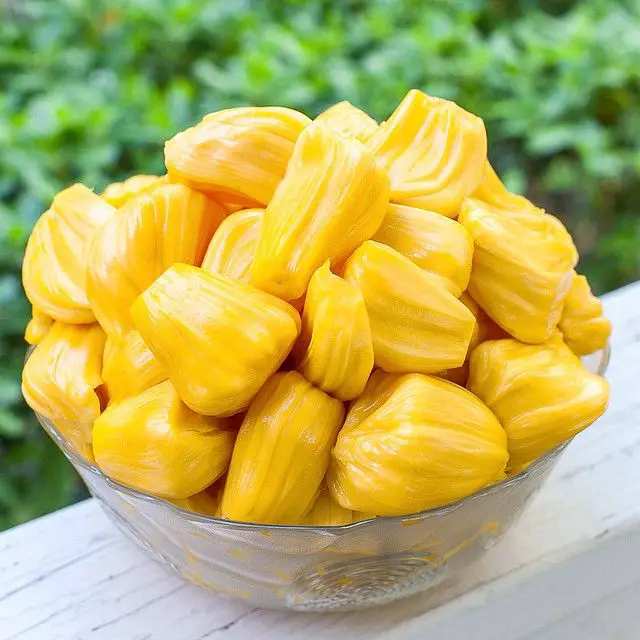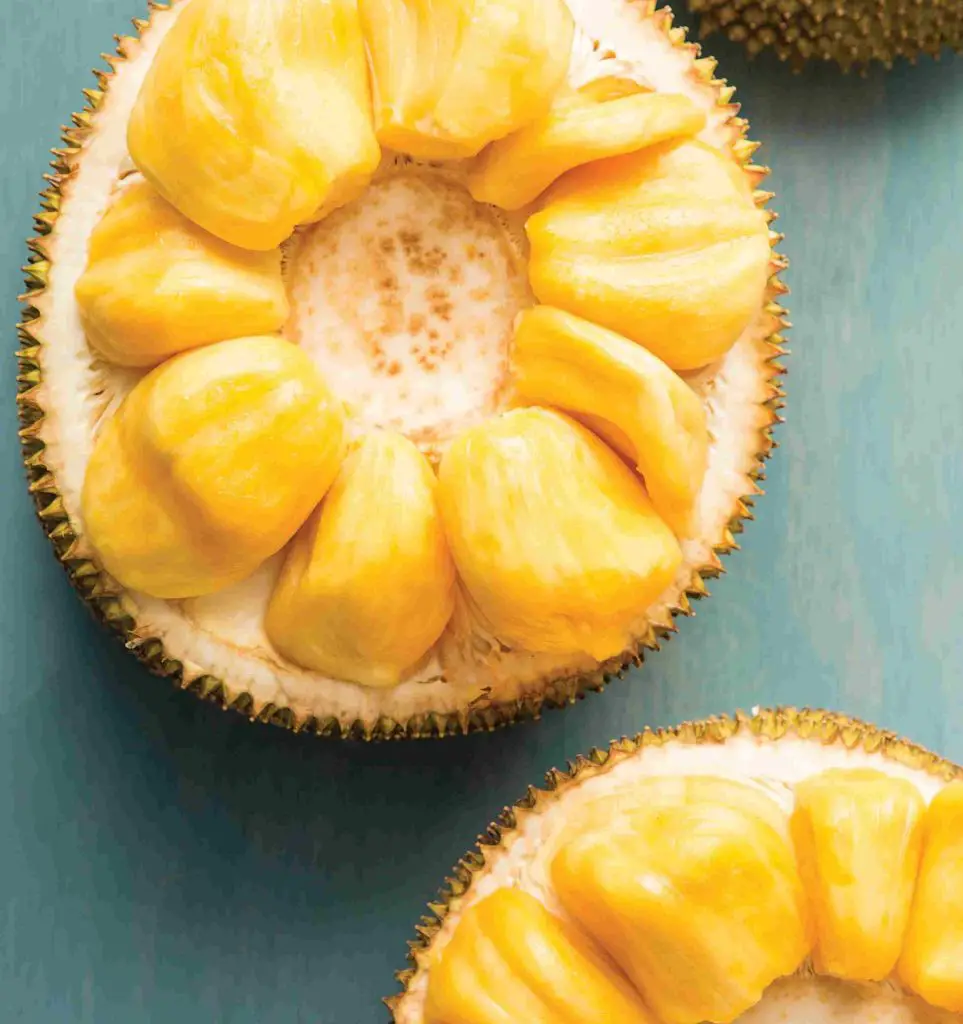Jackfruit is a tropical tree fruit native to Africa, Asia, and South America. If you’re imagining an orange or a lemon, think bigger: a single jackfruit may weigh at least 40 pounds! It looks like a giant mango with green skin and spikes.
Earlier research indicates that jackfruit has been ingested since ancient times.
According to the International Journal of Food Science, there are two types of jackfruit: firm, which is crunchier and considered of greater quality; and soft, which has small, spongey flakes and a sweeter taste.
Jackfruit is frequently used as a substitute for pulled meat, according to a nutritionist. Its stringy texture is claimed to mimic pulled pig, and vegans and vegetarians frequently utilize it as such.
Contents
Nutritional Information
According to the USDA, one cup of sliced jackfruit contains 157 calories, 1 gram of fat, 38 g of carbs, 2.8 g of protein, and 2.5 g of fiber.
Most fruits provide little protein. In comparison to other fruits, three grams per serving is relatively high, although it is inferior to meat. According to the USDA, one simple chicken breast contains 33.6 grams of protein.
Some experts have stated that It may not be as gratifying as animal protein. Several other plant-based proteins are superior to jackfruit in terms of protein content.

In addition, a one-cup serving of lentils has 17.9 grams of protein. They also suggest pairing jackfruit with plant-based protein sources such as chickpeas, lentils, or almonds. These foods also provide an increase in fiber.
Jackfruit is a source of additional essential nutrients. Its flesh is rich in vitamin C, and its seeds include protein, potassium, calcium, and iron.
And unlike other fruits, jackfruit includes B vitamins, such as vitamin B6, niacin, riboflavin, and folic acid, which are particularly helpful for maintaining a healthy nervous system.
Possible Health Advantages of Jackfruit
An expert dietitian says jackfruit offers a multitude of health benefits due to its high nutrient content. Furthermore, jackfruit is capable of the following.
Reduce Inflammation
According to the USDA, jackfruit helps reduce inflammation, and one cup of sliced jackfruit contains 22.6 milligrams (mg) of vitamin C.
According to a renowned health institute, males should consume 90 mg of vitamin C and women should ingest 75 mg per day; one serving of jackfruit provides more than 20 percent of this amount.
According to one of the famous clinics, vitamin C–rich meals can help reduce inflammation in the body, which may reduce the risk of chronic disease.
Promote Skin Health
Several nutritionists have stated that jackfruit is beneficial for enhancing skin health and reducing skin issues such as aging due to its high vitamin C and antioxidant content.
According to a previous study, vitamin C contributes to the creation of collagen, which gives the skin a plump and smooth appearance. A higher vitamin C intake was also connected with a lower risk of getting wrinkled skin.

According to another earlier study, jackfruit also includes phytonutrients (lignans, isoflavones, and saponins) that may have an anti-aging impact.
Keeps Heart Healthy
Additionally, jackfruit provides potassium and fiber, two elements believed to maintain a healthy heart. According to the heart health association, potassium reduces the blood pressure-lowering effects of salt.
And according to one of the renowned clinics, a diet high in fiber helps reduce cholesterol levels, blood pressure, and inflammation.
Weight Loss
Several experts claim that including jackfruit in your diet has the potential to aid in weight loss.
Each serving of jackfruit includes 2.5 grams of fiber. According to the USDA, green peas provide 8.8 grams of fiber per cup. It is recommended to get 21 to 25 g per day for women and 30 to 38 g per day for men.
However, this product will help you attain the recommended fiber consumption. According to a report published in a journal of medicine, the majority of Americans do not consume enough fiber.
According to this journal, fiber is an essential ingredient for achieving weight loss objectives since it provides bulk to the diet. It can help you feel fuller for longer periods of time, thereby reducing the need for frequent eating and grazing.
In addition, using jackfruit instead of beef can save you calories. It contains fewer calories than most meats. When used as a meat alternative, it can lower caloric consumption naturally.

According to the USDA, a 150 g portion of jackfruit contains 157 calories (before any sauces are applied), whereas a 150 g plate of pulled pork contains 375 calories. It has been established that avoiding meat in favor of a plant-based diet leads to weight loss.
A systematic review published in a journal discovered that a plant-based diet helped overweight individuals lose weight, possibly because they consumed more foods with fiber and plant proteins and fewer foods with saturated fats and animal proteins.
However, jackfruit does have more calories per serving than other fruits and is mostly composed of carbs, so it is crucial to control portion sizes to avoid overeating.
Dangers Of Consuming Jackfruit
Although jackfruit is generally harmless, some individuals may need to limit or avoid it. Certain individuals are allergic to it, particularly those allergic to birch pollen.
In addition, because of its ability to reduce blood sugar levels, diabetics may need to adjust their prescription dosages if they consume this fruit frequently.
However, jackfruit use has never been associated with major negative effects, and it is safe for most individuals to consume.
Conclusion
Jackfruit, if consumed in moderation, won’t make you gain weight, but if eaten in excess it might lead you to gain weight as it’s a high-calorie fruit.
If you are one of the many people who have begun to embrace meatless meals, you should be aware of jackfruit. Its neutral flavor makes it an ideal complement to a variety of sauces and seasonings, and its texture mimics pulled meat.
Jackfruit is an excellent source of several essential nutrients, including fiber, vitamin C, B vitamins, and potassium. Keep in mind, however, that it is not a protein powerhouse like other meat alternatives and is primarily composed of carbohydrates.
